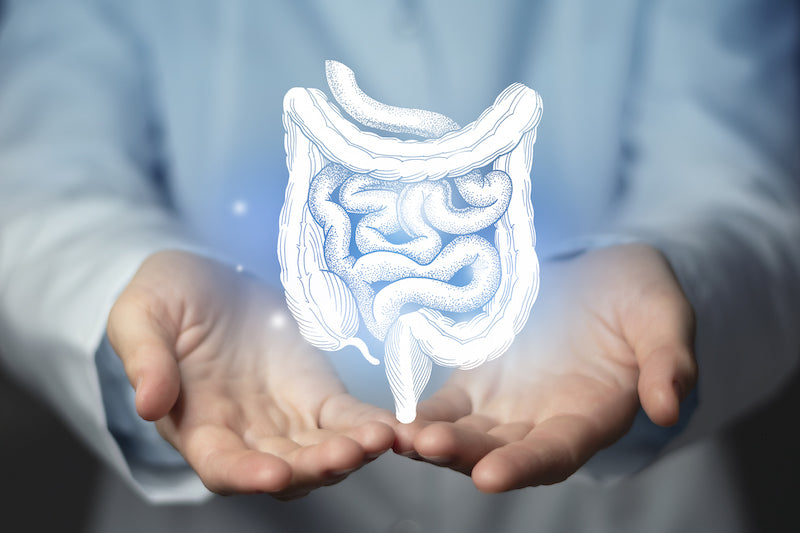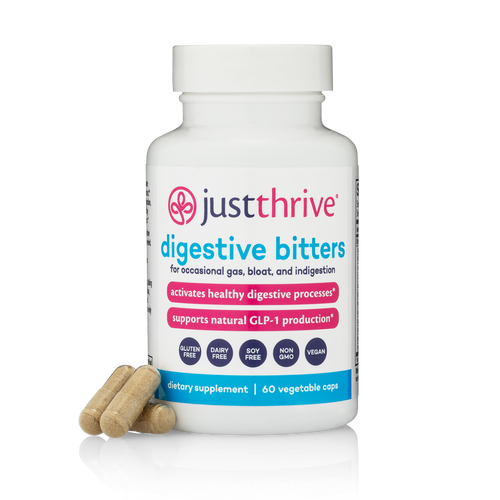How to support this crucial probiotic strain
Wonder why it’s been impossible to lose your belly fat? Why your blood pressure’s up…your blood sugar’s about to cross the line… your cholesterol disappoints your doctor?
If you’ve been struggling with your weight and having trouble keeping your numbers in line, your metabolic health is out of order. And that’s a big problem, because it increases your risk for serious health problems from heart attack to Alzheimer’s to cancer.
While there’s all kinds of medication and lifestyle changes you can try, most of them don’t get to the root cause of your problems.
That’s because your metabolic health is highly dependent on a particular species of beneficial gut bacteria called Akkermansia muciniphila that most people don’t have nearly enough of.
The Importance of Metabolic Health
Your metabolic system drives all the chemical reactions in your body. That includes things like breaking down food into nutrients, burning calories by converting food into energy, and using those nutrients and energy to repair your cells, tissues, and organs. So when your metabolic system glitches, it’s impossible to be fully healthy.
There are five key measures of metabolic health:
- blood sugar
- blood pressure
- triglyceride levels
- HDL cholesterol levels
- waist circumference

If any one of those is out of whack, your health suffers. When three of those factors go the wrong way, you have full-blown metabolic syndrome. And that can lead you down a path of pain and illness because metabolic syndrome increases your risk of:[1,2,3]
- Breast cancer by up to 673%
- Colorectal cancer up to 261%
- Liver cancer by up to 506%
- Stroke by 189%
- Diabetes by 515%
- Death from heart disease by 144%
- Premature death from any cause by 124%
This is just part of a very long list of nasty health issues linked to metabolic syndrome—and nearly 42% of Americans have it.[4] But there is hope: A species of native gut bacteria, Akkermansia muciniphila, could hold the key to turning things around.[5,6]
Meet Akkermansia: Your Gut Bacteria Allstar
Of the trillions of bacteria in your gut microbiome, Akkermansia muciniphila holds the starring role. It’s a keystone species of bacteria, meaning it’s foundational to your body’s proper functioning. In a healthy gut, Akkermansia makes up about 1 to 4% of the total population. But without enough of this strain in your gut, the whole microbiome ecosystem shifts away from good health.[7]
Akkermansia has an important distinction that makes it stand out from many other bacteria. It prefers to hang out in the protective mucosal gut barrier—the lining of your intestines that’s responsible for keeping toxins and pathogens locked inside. That barrier is made up of a special protein called mucin, and Akkermansia loves to munch on mucin—so much so that it’s right in the name (muciniphila means loves mucin).
And when it comes to keeping you well, Akkermansia is a metabolic hero. Research shows that people with more abundant Akkermansia have healthy blood sugar, triglyceride levels, and body fat distribution.[8] It also helps ward off autoimmune and more persistent conditions.[9] Scientists consider it an important marker of wellness and longevity.[10,11]
Unfortunately...
Millions of people don’t have enough Akkermansia in their gut.
When your gut microbiome doesn’t have enough Akkermansia, your metabolic health suffers. But get those populations back up to where they belong and positive metabolic changes will follow.
One study found that people struggling with weight saw dramatic improvements when their Akkermansia populations increased, including:[12]
- increased insulin sensitivity by 29%
- lowered cholesterol by 9%
- reduced fat mass by 1.4 kg
- decreased hip circumference by 2.6 cm
- reduced body weight by 2.3 kg
Other research shows that increasing Akkermansia helps support healthy inflammatory responses, weight management, metabolism, and balanced blood sugar.[13]
But in order for these powerful bacteria to work their magic, they need a safe and stable gut environment. And it’s very easy for the gut microbiome to get knocked out of balance.
An Unbalanced Gut Kills Akkermansia
When your gut microbiome is out of balance, a common condition called dysbiosis, pathogenic bacteria vastly outnumber beneficial probiotic bacteria. The pathogens crowd out the probiotics, gobbling up resources and space, making it impossible for beneficial species like Akkermansia to flourish.
At the same time, dysbiosis damages the mucosal gut barrier. That takes away Akkermansia’s preferred home and food source, causing the population to decrease dramatically.
So before your Akkermansia population can begin to grow, your gut microbiome needs to be in healthy balance and your mucosal gut barrier has to be strong and protected by a thick layer of mucin.
The Best Way to Support a Healthy Akkermansia Population
It might seem like taking an Akkermansia probiotic supplement is the best way to increase its population. But that’s not how your gut microbiome works.
According to well-known research microbiologist Kiran Krishnan, Akkermansia are anaerobic bacteria (that means exposure to oxygen kills it). While scientists can create Akkermansia and implant it (rectally) in a clinical lab, it’s not practical to do that commercially as a probiotic supplement. After all, Akkermansia is highly sensitive to oxygen, and it’s unlikely to survive the journey to the distal colon.[14]
On top of that, no matter how much Akkermansia you consume—if it even gets to your gut alive —it won’t survive and flourish in a hostile environment.
Kiran tells us that everyone has Akkermansia in their gut, even if it’s in very small numbers. And when those native Akkermansia have a safe gut environment, they’ll naturally repopulate. To create a nurturing gut environment, you need to crowd out pathogenic bacteria that threaten your Akkermansia, support and sustain a healthy gut mucosal barrier where Akkermansia can flourish, and finally, make sure your Akkermansia population has plenty of prebiotic fiber to nourish them.
The best way to accomplish those gut goals is to create the right environment with the help of spore probiotics, and deliver preferred nutrition with prebiotics. Research shows that a combination of four spore probiotics helps create the right environment in the gut microbiome… one that favors a diverse population of probiotic bacteria, diminishes pathogenic bacteria, and helps your Akkermansia flourish. The combination also helped maintain and protect the gut barrier.[15] The four spore probiotics include:
- Bacillus subtilis
- Bacillus indicus
- Bacillus coagulans
- Bacillus clausii
At the same time, you need to supply the right kind of nourishment for those keystone probiotics. And while Akkermansia love to munch on mucin, they also need plenty of prebiotic fiber—especially a form called fructooligosaccharides (FOS). One animal study found that FOS could increase Akkermansia by 1000-fold in just 5 weeks.[16]
When you put these four spore probiotics, plus a prebiotic containing FOS together, Kiran tells us that Akkermansia populations grow dramatically, anywhere from 100 to 1000-fold.[14] (Listen to the full recording here.)
Let Your Akkermansia Flourish with Just Thrive
Akkermansia muciniphila needs a balanced gut microbiome and a strong, thick mucosal barrier to deliver its natural metabolic health benefits. And for that, you can count on Just Thrive.
Just Thrive Probiotic & Antioxidant contains four proven spore probiotics:
- Bacillus indicus HU36™
- Bacillus subtilis HU58™
- Bacillus clausii
- Bacillus coagulans
This clinically studied team supports a healthy, well-balanced gut microbiome and delivers extra support for the gut barrier.
Just Thrive PREbiotic combines FOS (fructooligosaccharides) with two other proven prebiotic fibers that selectively nourish beneficial bacteria like Akkermansia.
And for an extra layer of gut barrier support, Gut 4-tify helps create a healthy mucosal barrier packed with mucin. Gut 4-tify contains four amino acids that promote mucin production and powerful polyphenols that soothe and strengthen the intestinal lining, creating a welcoming home for Akkermansia.
>> Make your gut microbiome Akkermansia-friendly with Just Thrive Probiotic, PREbiotic, and Gut 4-tify.
Not sure if Just Thrive Probiotic, PREbiotic, and Gut 4-tify are right for you? We've got your back!
We’re confident that when you take each of these gut health heroes as directed, you’ll notice positive benefits to your overall health.
But if you aren’t completely happy, let us know. Every Just Thrive purchase comes with our Bottom of the Bottle, 100% money back guarantee. So, if you’re not satisfied with your purchase for any reason, you can request a full product refund at any time. Even if it’s been 3 days… 3 weeks… or 3 months. Even if the bottle is empty!
>> Try Just Thrive Probiotic, PREbiotic, and Gut 4-tify 100% RISK FREE, and save 30% on your first month’s subscription with code SUB30.
Sources
- Karra P, et al. Metabolic dysfunction and obesity-related cancer: Beyond obesity and metabolic syndrome. Obesity (Silver Spring). 2022 Jul;30(7):1323-1334.
- Li W, Chen D, Peng Y, Lu Z, Kwan MP, Tse LA. Association Between Metabolic Syndrome and Mortality: Prospective Cohort Study. JMIR Public Health Surveill. 2023 Sep 5;9:e44073.
- Moghadam-Ahmadi A, et al. Association between metabolic syndrome and stroke: a population based cohort study. BMC Endocr Disord. 2023 Jun 6;23(1):131.
- Liang X, Or B, Tsoi MF, Cheung CL, Cheung BMY. Prevalence of metabolic syndrome in the United States National Health and Nutrition Examination Survey 2011-18. Postgrad Med J. 2023 Aug 22;99(1175):985-992.
- Zhou Q, Pang G, Zhang Z, Yuan H, Chen C, Zhang N, Yang Z, Sun L. Association Between Gut Akkermansia and Metabolic Syndrome is Dose-Dependent and Affected by Microbial Interactions: A Cross-Sectional Study. Diabetes Metab Syndr Obes. 2021 May 17;14:2177-2188.
- Yan J, Sheng L, Li H. Akkermansia muciniphila: is it the Holy Grail for ameliorating metabolic diseases? Gut Microbes. 2021 Jan-Dec;13(1):1984104.
- Zhang T, Li Q, Cheng L, Buch H, Zhang F. Akkermansia muciniphila is a promising probiotic. Microb Biotechnol. 2019 Nov;12(6):1109-1125.
- Dao MC, Everard A, Aron-Wisnewsky J, et al. Akkermansia muciniphila and improved metabolic health during a dietary intervention in obesity: relationship with gut microbiome richness and ecology. Gut 2016;65:426-436.
- Rodrigues VF, et al. Akkermansia muciniphila and Gut Immune System: A Good Friendship That Attenuates Inflammatory Bowel Disease, Obesity, and Diabetes. Front Immunol. 2022 Jul 7;13:934695.
- Luo, Y., Lan, C., Li, H. et al. Rational consideration of Akkermansia muciniphila targeting intestinal health: advantages and challenges. npj Biofilms Microbiomes 8, 81 (2022).
- Ghotaslou R, et al. The metabolic, protective, and immune functions of Akkermansia muciniphila. Microbiol Res. 2023 Jan;266:127245.
- Depommier, C., Everard, A., Druart, C. et al. Supplementation with Akkermansia muciniphila in overweight and obese human volunteers: a proof-of-concept exploratory study. Nat Med 25, 1096–1103 (2019).
- Pellegrino A, Coppola G, Santopaolo F, Gasbarrini A, Ponziani FR. Role of Akkermansia in Human Diseases: From Causation to Therapeutic Properties. Nutrients. 2023; 15(8):1815.
- Recording with Kiran Krishnan: https://fccdl.in/GMdXMzqavL
- Marzorati M, Van den Abbeele P, Bubeck S, Bayne T, Krishnan K, Young A. Treatment with a spore-based probiotic containing five strains of Bacillus induced changes in the metabolic activity and community composition of the gut microbiota in a SHIME® model of the human gastrointestinal system. Food Res Int. 2021 Nov;149:110676.
- Zhou K. Strategies to promote abundance of Akkermansia muciniphila, an emerging probiotics in the gut, evidence from dietary intervention studies. J Funct Foods. 2017 Jun;33:194-201.














